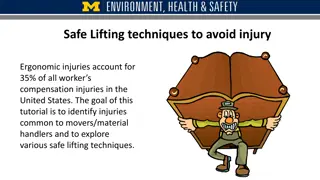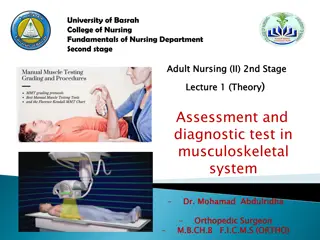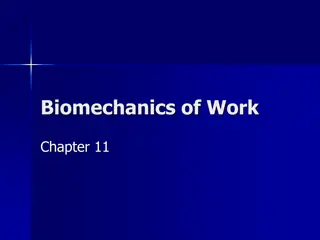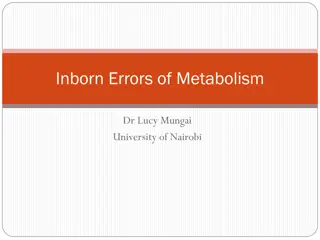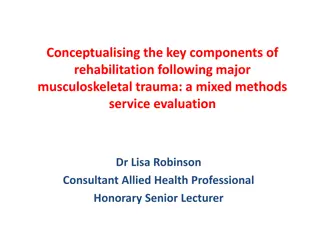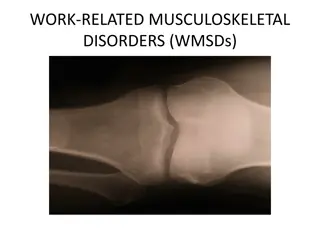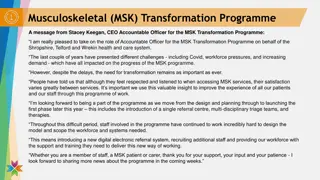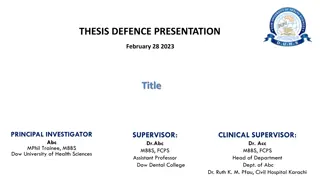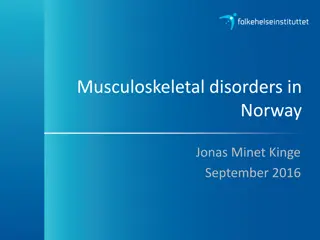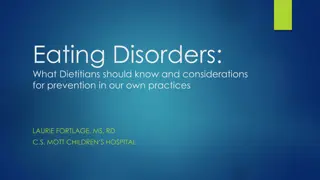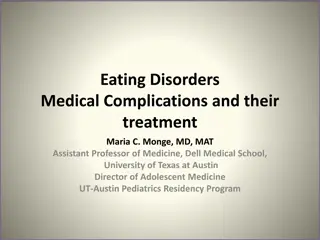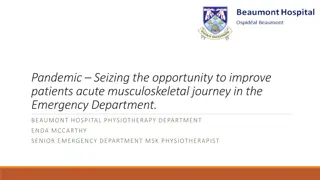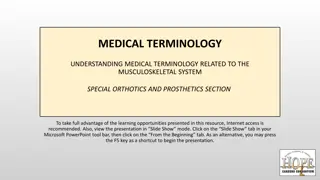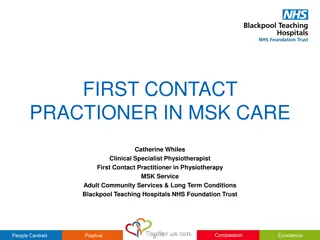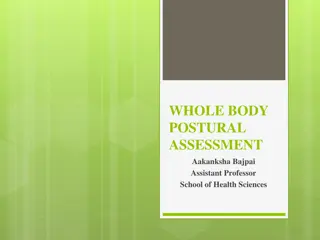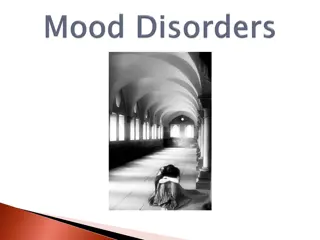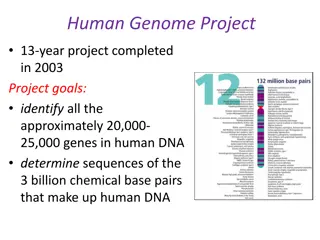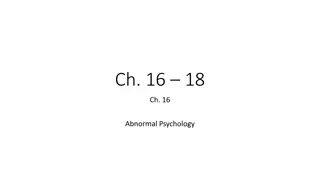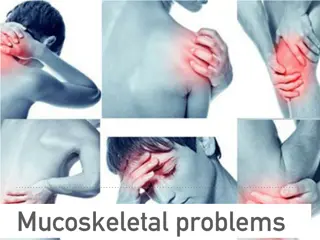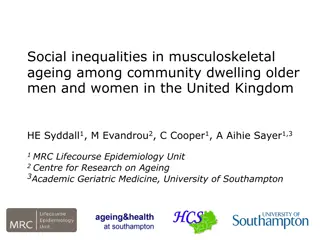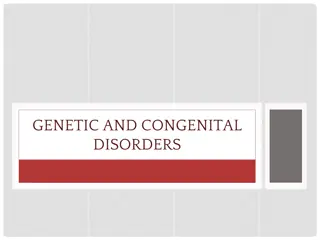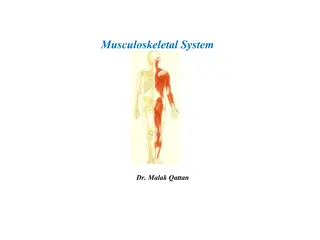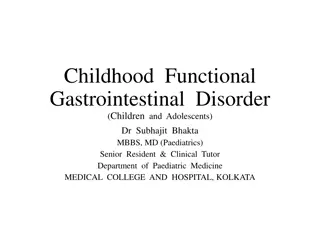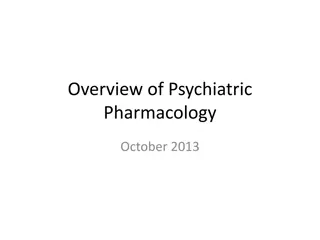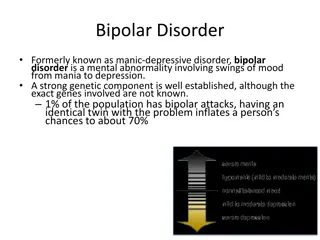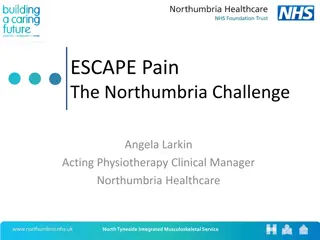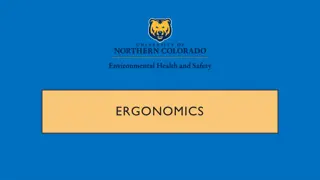Musculoskeletal System Assessment Guidelines
Learn how to conduct a thorough musculoskeletal system assessment, including functional assessments and physical examination guidelines. Explore assessment techniques for ADLs, gait observation, joint palpation, muscle strength testing, and more in nursing practice.
1 views • 17 slides
Safe Lifting Techniques to Avoid Ergonomic Injuries: A Comprehensive Guide
Ergonomic injuries are a significant concern in the workplace, with musculoskeletal disorders being a common result. This tutorial explores the risks faced by movers/material handlers and provides insights into safe lifting techniques to prevent injuries. Understanding the importance of ergonomics i
6 views • 21 slides
Assessment and Diagnostic Tests in Musculoskeletal System Pain
Pain in musculoskeletal conditions varies, such as bone pain described as dull and deep, muscular pain as soreness, fracture pain as sharp, and joint pain worsens with movement. Specific assessments by nurses include checking body alignment, joint symmetry, signs of inflammation, pressure sources, a
7 views • 38 slides
Looking for the best Dry Needling in Mayfair
If you are looking for the Best Dry Needling in Mayfair, then contact them at Skeletos Clinic. Welcome to Skeletos Clinic, where healing meets expertise in a holistic approach to musculoskeletal wellness. Situated in the heart of Marylebone, their clinic offers a comprehensive range of services desi
1 views • 6 slides
Overview of Human Genetic Disorders
Human genetic disorders encompass a range of conditions, from recessive disorders like cystic fibrosis to dominant disorders such as Huntington's disease. Examples include cystic fibrosis, Huntington's disease, and sickle-cell anemia. Understanding genetic disorders involves research and awareness o
0 views • 10 slides
Understanding Biomechanics of Work and Musculoskeletal System
Explore the biomechanics of work and musculoskeletal system in this comprehensive overview. Learn about the impact of overexertion injuries, NIOSH reports, and the structure and functions of the musculoskeletal system. Delve into biomechanical models, static and dynamic models, and the biomechanics
0 views • 24 slides
Overview of Anxiety and Related Disorders
Anxiety disorders, such as PTSD, panic disorders, phobias, agoraphobia, and OCD, are characterized by varying degrees of fear and distress. Anxiety is a normal response to danger, but when it becomes chronic, it can lead to debilitating conditions. PTSD occurs post-trauma, panic disorders involve in
1 views • 42 slides
Understanding Somatic Symptom Disorders, Conversion Disorders, and Dissociative Disorders
Somatic symptom disorders manifest as physical symptoms without apparent cause, while conversion disorders involve specific physical symptoms incompatible with medical conditions. Illness anxiety disorder involves interpreting normal sensations as disease symptoms. Dissociative disorders lead to a s
1 views • 41 slides
Essential Skills for Musculoskeletal History Taking
History taking is crucial in diagnosing musculoskeletal conditions, with a clinician being 60% closer to a diagnosis with a thorough history. This session covers the structure of history, MSK systemic review, pain assessment, swelling evaluation, and more. Students will learn to take a relevant hist
0 views • 24 slides
Understanding Inborn Errors of Metabolism and Metabolic Disorders
Inborn Errors of Metabolism (IEM) are genetic disorders that disrupt metabolic pathways, leading to substrate accumulation or product deficiency. These disorders can be classified based on toxic accumulation, protein metabolism, carbohydrate intolerance, lysosomal storage issues, energy production d
0 views • 29 slides
Understanding Co-occurring Mental and Physical Health Conditions
Co-occurring mental and physical health disorders are prevalent and require an integrative multidisciplinary approach for effective assessment and treatment. This holistic approach helps address the complexity of managing multiple disorders in an integrated healthcare setting. Through a multi-direct
1 views • 37 slides
Evaluation of Rehabilitation Components for Musculoskeletal Trauma
This evaluation focuses on the rehabilitation needs of individuals with major musculoskeletal trauma, aiming to identify, prioritize, and enhance services. The project involves generating ideas, sorting and rating statements, and mapping key components such as long-term support, therapy input, and e
0 views • 15 slides
Understanding Functional GI Disorders: A Comprehensive Overview
Functional GI disorders encompass a range of conditions affecting the gastrointestinal system, such as irritable bowel syndrome and disorders of the gut-brain interaction. These disorders are characterized by no structural abnormalities but are influenced by factors like motility disturbance, viscer
0 views • 42 slides
Understanding Work-Related Musculoskeletal Disorders (WMSDs)
Work-Related Musculoskeletal Disorders (WMSDs) are a significant cause of human suffering and productivity loss, impacting millions of U.S. workers annually. These injuries can result from repetitive motion or cumulative trauma, leading to conditions such as tendonitis, carpal tunnel syndrome, and m
0 views • 12 slides
Musculoskeletal Transformation Programme Overview
Stacey Keegan, CEO, outlines the importance of the Musculoskeletal Transformation Programme in Shropshire, Telford, and Wrekin. Despite challenges, the goal is to enhance patient experience by implementing new referral processes, triage teams, and therapies. The programme aims to streamline services
0 views • 9 slides
Study on Work-Related Musculoskeletal Disorders and Median Nerve Entrapment in Upper Limb
Investigating the prevalence, factors, and treatment options for work-related musculoskeletal disorders, focusing on median nerve entrapment in the upper limb. The study aims to provide insights into this condition through a thorough literature review and research objectives.
1 views • 31 slides
Understanding Genetic Disorders and Their Impact on Health
Genetic disorders are caused by abnormalities in genes or chromosomes, leading to various health conditions. Inherited disorders can be passed down from parents to children, affecting physical makeup and processes in the body. In India, there is a high prevalence of genetic disorders, particularly i
1 views • 12 slides
Musculoskeletal Disorders in Norway: Statistics and Analysis
This information provides an in-depth look at musculoskeletal disorders in Norway, including disease categories, public expenditures, burden of disease, DALYs by ICD10 chapters, health expenditures, productivity loss, deaths, and YLDs in 2013. The data sheds light on the prevalence, impact, and dist
0 views • 9 slides
Understanding Eating Disorders: Types, Signs, Effects, and Recovery
Eating disorders are mental disorders characterized by unhealthy eating habits and can have severe physical and psychological consequences. This article explores the definition of eating disorders, signs to look out for, different types such as Anorexia Nervosa, Bulimia Nervosa, Pica, and Purging Di
0 views • 10 slides
Understanding Eating Disorders: Insights for Dietitians
Eating disorders are complex neurobiological conditions that are not merely about control or weight management. These disorders can affect individuals of all genders, body sizes, and socioeconomic backgrounds. Dietitians play a crucial role in identifying, assessing, and treating eating disorders, a
0 views • 41 slides
Understanding Eating Disorders: Medical Complications and Treatment
This presentation by Dr. Maria C. Monge covers the common eating disorders in teenage patients, potential medical complications, and the role of the medical team in treatment. It includes definitions of disorders like Anorexia Nervosa, Bulimia Nervosa, and Binge Eating Disorder according to DSM-5 cr
0 views • 60 slides
Enhancing Acute Musculoskeletal Patient Care in Beaumont ED
Beaumont Hospital's Physiotherapy Department, led by Senior MSK Physiotherapist Enda McCarthy, has seized the opportunity during the pandemic to improve the acute musculoskeletal journey of patients in the Emergency Department. By implementing a service development strategy focusing on assessing and
0 views • 4 slides
Medical Terminology: Musculoskeletal System & Orthotics
Delve into the world of medical terminology related to the musculoskeletal system, orthotics, and prosthetics. Explore prefixes, suffixes, roots/stems for bones, joints, muscles, and nerves. Enhance your understanding through self-assessments and additional learning resources provided in this educat
0 views • 207 slides
Advanced Musculoskeletal Care Implementation in Blackpool Community Services
Catherine Whiles, a Clinical Specialist Physiotherapist, leads the first contact practitioner model in Blackpool, aiming to enhance musculoskeletal care access. The FCP initiative, part of the NHS implementation plan, collaborates with GP practices and offers rapid access physiotherapy services. Fyl
2 views • 9 slides
The Importance of Whole Body Postural Assessment in Occupational Safety and Health
Whole body postural assessments play a crucial role in evaluating ergonomic factors in the workplace to prevent musculoskeletal disorders. Popular observational techniques such as NIOSH lifting equation, RULA, and REBA are commonly used. Ergonomic and job analysis checklists are tailored tools used
0 views • 21 slides
Understanding Neurodevelopmental Disorders in Childhood and Adolescence
Neurodevelopmental disorders in childhood and adolescence encompass a range of conditions including intellectual disabilities, communication disorders, autism spectrum disorder, and attention deficit/hyperactivity disorder. These disorders impact cognitive development, adaptive functioning, and comm
0 views • 30 slides
Understanding Sleep Disorders: Classification and Diagnosis
Sleep disorders encompass various conditions affecting sleep patterns and quality. They are classified into categories such as insomnia, sleep-related breathing disorders, central disorders of hypersomnolence, circadian rhythm sleep-wake disorders, parasomnias, and sleep-related movement disorders.
0 views • 32 slides
Understanding Grief and Depressive Disorders: A Comparative Analysis
Grief and depressive disorders share similarities but also have distinct differences. Grief is a universal emotional state following loss, while depressive disorders involve prolonged mood disturbances. The stages of grief include denial, anger, bargaining, depression, and acceptance, with intervent
0 views • 79 slides
Understanding Genetic Disorders and the Human Genome Project
The Human Genome Project, completed in 2003, aimed to identify all human genes and DNA sequences. Genetic disorders, like autosomal disorders and Huntington's disease, can result from mutations at different levels, affecting single genes, chromosomes, or multiple genes. Albinism and cystic fibrosis
0 views • 37 slides
Understanding Abnormal Psychology: Disorders, Symptoms, and Treatments
Explore the world of abnormal psychology through the lens of different disorders like depression, anxiety, and phobias. Learn about the definitions of abnormal behavior, DSM-V classifications, and various types of psychological disorders. Delve into the complexities of mental health conditions such
0 views • 39 slides
Understanding Musculoskeletal Problems and Injuries
Musculoskeletal problems encompass a range of issues affecting the muscles, bones, and joints. From sprains and strains to conditions like fibromyalgia and frozen shoulder, proper diagnosis and treatment are crucial for optimal recovery. Differentiating between various injuries and understanding ref
0 views • 26 slides
Overview of Classification of Psychiatric Disorders
Psychiatric disorders are illnesses with various manifestations that impact functioning due to disturbances in biological, social, genetic, and other factors. Two key classification systems, ICD-10 and DSM-5, categorize over 200 types of psychiatric illnesses. The ICD-10 includes categories like org
0 views • 18 slides
Social Inequalities in Musculoskeletal Ageing Among UK Older Adults
Musculoskeletal disorders pose a significant burden on healthcare in the UK, particularly among older individuals. This study aims to explore social inequalities in musculoskeletal ageing among community-dwelling older men and women aged 59-73. Utilizing data from the Hertfordshire Cohort Study, fac
0 views • 19 slides
Overview of Genetic and Congenital Disorders and Their Causes
Explore the terminology, causes, characteristics, and results of genetic and congenital disorders, as well as the disorders of single-gene inheritance. Learn about autosomal dominant disorders like Marfan Syndrome and Neurofibromatosis. Discover how single-gene disorders are inherited and their impa
0 views • 24 slides
Understanding the Musculoskeletal System and Common Bone Disorders
The musculoskeletal system comprises bones, joints, ligaments, cartilage, and muscles, with the skeleton providing support, protection, and enabling movement. Learn about the functions of the skeletal system, its divisions, and common bone diseases such as osteoporosis and fractures.
0 views • 8 slides
Understanding Childhood Functional Gastrointestinal Disorders
Functional Gastrointestinal Disorders (FGIDs) in children and adolescents are characterized by chronic or recurring symptoms that cannot be fully explained by current structural or biochemical tests. These disorders emphasize the role of normal development in symptom presentation and the lack of evi
0 views • 46 slides
Overview of Psychiatric Pharmacology: A Comprehensive Guide from 2013
This presentation delves into the nuances of psychiatric pharmacology, exploring common psychiatric conditions, historical perspectives on medical treatments, categories of psychiatric medications, and principles of treatment. It also touches on mental illness definitions from DSM-IV-TR and DSM-V, a
0 views • 27 slides
Understanding Mental Health Disorders: Bipolar Disorder, Anxiety Disorders, & More
Exploring various mental health disorders such as Bipolar Disorder, Anxiety Disorders, Generalized Anxiety Disorder, Panic Disorder, and Phobic Disorders. Learn about their symptoms, prevalence, and impacts on individuals' lives.
0 views • 41 slides
North Tyneside Integrated Musculoskeletal Service Overview
The North Tyneside Integrated Musculoskeletal Service offers an innovative approach to managing musculoskeletal conditions, with a focus on ESCAPE Pain programs for individuals with hip and knee pain. The service started in January 2018, targeting a practice population of 215,000. Facilitators and i
0 views • 17 slides
Understanding Ergonomics and Preventing Work-Related Musculoskeletal Disorders
Ergonomics focuses on fitting the job to the worker to promote well-being, safety, and productivity. Overexertion and repetitive motion are common causes of workplace injuries. Musculoskeletal disorders affect various body parts, leading to symptoms like pain, numbness, and stiffness. Common work-re
0 views • 18 slides

